Top 10 Classic Chinese Love Poems
Poetry has been a favorite literary genre in China for thousands of years. And many of the Chinese poems are about love. Here I compiled a number of well-known love poems from China’s long literary history, though some of them were written by unknown author, all these poems remain alive and on people s lips since they were written.
1. Song of River City 《江城子•记梦》by Su Shi (Song Dynasty)
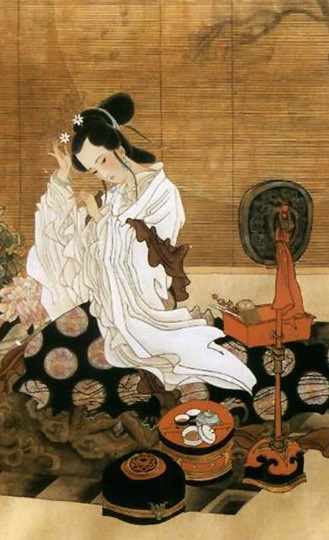 十年生死两茫茫,不思量,自难忘。
十年生死两茫茫,不思量,自难忘。
千里孤坟,无处话凄凉。
纵使相逢应不识,尘满面,鬓如霜。
夜来幽梦忽还乡,小轩窗,正梳妆。
相顾无言,惟有泪千行。
料得年年肠断处,明月夜,短松冈。
Ten years, dead and living dim and draw apart.
I don’t try to remember,
But forgetting is hard.
Lonely grave a thousand miles off,
Cold thoughts, where can I talk them out?
Even if we met, you wouldn’t know me,
Dust on my face,
Hair like frost.
In a dream last night suddenly I was home.
By the window of the little room,
You were combing your hair and making up.
You turned and looked, not speaking,
Only lines of tears coursing down.
Year after year will it break my heart?
The moonlit grave,
The stubby pines.
The poem was written around 1075, when the poet Su Shi dreamed about his wife. He married his wife Wang Fu in 1054 at her fifteen. Unfortunately his wife died in 1065, 11 years after they get married. The next year he took her body back to his homeland Sichuan and buried it in the family graveyard, planting some pines around the tomb. He loved his wife so much and composed this poem to express his feelings.
2. Song of Divination 《卜算子》by Li Zhiyi
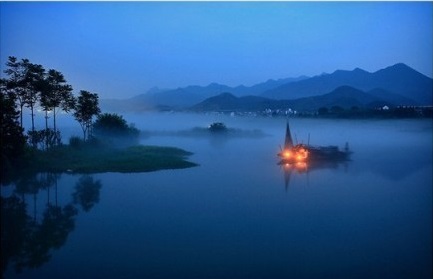 我住长江头,
我住长江头,
君住长江尾。
日日思君不见君,
共饮长江水。
此水几时休,
此恨何时已。
只愿君心似我心,
定不负相思意。
I live upstream and you downstream,
From night to night of you I dream.
Unlike the stream you are not in view,
Though both we drink from River Blue.
When will the river no more flow?
When will my grief no more grow?
I wish your heart will be like mine,
Then not in vain for you I pine.
Li Zhiyi is one of Su Shi’s disciples and a member of the literati group “Yuanyou poetic style”. This poem surrounds the Yangtze River to express men and women’s sentiment of lovesickness.
Related: Top 10 Chinese Love Songs
3. Beating the Drum《诗经.邶风.击鼓》 (Spring & Autumn Period)
从孙子仲,平陈与宋。
不我以归,忧心有忡。
爰居爰处,爰丧其马,
于以求之,于林之下。
死生契阔,与子成说。
执子之手,与子偕老。
于嗟阔兮,不我活兮。
于嗟洵兮,不我信兮。
The drums are booming out;
We’re busy all about,
Building walls high and low.
Alone I southward go.
I follow Sun Zizhong
To fight with Chen and Song.
I cannot homeward go;
My heart is full of woe.
Where stops and stays our force?
I’ve lost my battle horse.
O where can it be found?
It’s buried underground.
“Meet or part, live or die,
We’ve made oath, you and I.
Give me your hand I’ll hold,
And live with me till old!”
With my wife I’ve long parted.
Can I live broken-hearted?
Alas! the oath we swore
Can be fulfilled no more.
This poem expresses homesick mood of officers and soldiers in the battlefields. The verse “Give me your hand I’ll hold, And live with me till old!” has become the best love oath for later generation lovers.
4. God! 《上邪》(Han Dynasty)
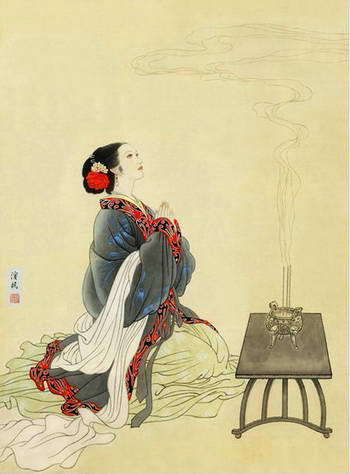 我欲与君相知,
我欲与君相知,
长命无绝衰。
山无陵,
江水为竭,
冬雷震震,
夏雨雪 ,
天地合,
乃敢与君绝!
I want to be your love for ever and ever,
Without break or decay.
When the hills are all flat,
The rivers are all dry.
When it thunders in winter,
When it snows in summer
When heaven and earth mingle,
Not till then will I part from you.
The poem comes from Yuefu folk poems of Han Dynasty. The hero takes an oath that: Even if the seas go dry and rocks crumble, her love remains firm. The poem is a woman`s warm confession to her lover.
5. On And On, Going On And On《行行重行行》 (Eastern Han Dynasty)
相去万余里,
各在天一涯。
道路阻且长,
会面安可知。
胡马依北风,
越鸟巢南枝。
相去日已远,
衣带日已缓。
浮云蔽白日,
游子不顾返。
思君令人老,
岁月忽已晚。
弃捐勿复道,
努力加餐饭。
On and on, going on and on,
Away from you to live apart.
Ten thousand miles and more between us,
Each at opposite ends of the sky.
The road I travel is steep and long;
who knows when we meet again?
The Hu horse leans into the north wind,
The bird nests in southern branches.
Day by day our parting grows more distant,
Day by day robe and belt dangle looser.
Shifting clouds block the white sun,
The traveler does not look to return.
Thinking of you makes one old,
Years and months suddenly go by.
Abandoned, I will say no more,
but pluck up strength and eat my fill.
The poem is about solicitude, departure and scourge of war during the turmoil years of the late Eastern Han Dynasty. The poem is full of a woman’s deep concern over her husband in the foreign land.
6. Immortals at the Magpie Bridge《鹊桥仙》by Qin Guan (Song Dynasty)
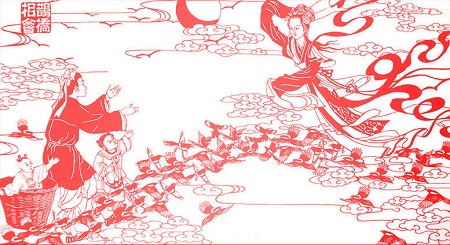 织云弄巧,
织云弄巧,
飞星传恨,
银汉迢迢暗度。
金风玉露一相逢,
便胜却人间无数。
柔情似水,
佳期如梦,
忍顾鹊桥归路。
两情若是久长时,
又岂在朝朝暮暮。
Clouds float like works of art,
Stars shoot with grief at heart,
Across the Milky Way the Cowherd meets the Maid.
When Autumn’s Golden Wind embraces Dew of Jade,
All the love scenes on earth, however many, fade.
Their tender love flows like a stream,
Their happy date seems but a dream,
How can they bear a separate homeward way?
If love between both sides can last for aye,
Why need they stay together night and day?
The poem name Immortals at the Magpie Bridge derives from the myth of the sincere love between the Cowboy (Niulang) and the Weaver (Zhinu), who are separated by the Heavenly Queen with the Milky Way and permitted to meet once a year at the bridge formed by the magpies. The poem borrows this traditional love story to express human‘s joys and sorrows.
7. The Tune of The Wild Geese’s Tomb 《雁邱词》 by Yuan Haowen
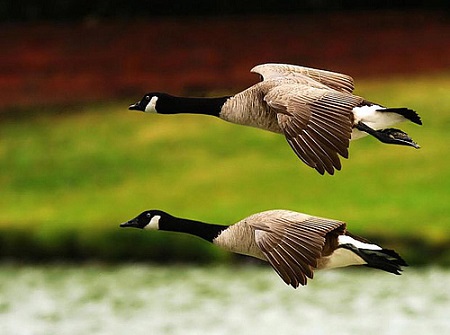 问世间情是何物,直教生死相许。
问世间情是何物,直教生死相许。
天南地北双飞客,老翅几回寒暑。
欢乐趣,离别苦,就中更有痴儿女。
君应有语,渺万里层云,千山暮雪,只影向谁去。
横汾路,寂寞当年箫鼓,荒烟依旧平楚。
招魂楚些何嗟及,山鬼暗啼风雨。
天也妒,未信与,莺儿燕子俱黄土。
千秋万古,为留待骚人,狂歌痛饮,来访雁邱处。
Among the earthly mortals, I ask: what is Love
That engages couples through life and death?
This flying pair, travelling from south to north,
Had old wings, which survived several summers and winters.
Staying paired is happy,
But to sever, bitter: a trap in itself where devoted lovers
Still long to be trapped. He must have had a thought:
For whom shall I trail a forlorn shadow flying over
Ten thousand miles of grey clouds
And mountains of night snow?
On this road by Fen River, the old pipes and drums
Are gone. Only bleak smoke and vast woods are left.
Vain to evoke the ancient ghosts. The Mountain Spirit
Also wails in vain. Heaven envies the geese,
Not believing they’ll return to dust like orioles
And swallows. There they’ll remain, for a thousand
Autumns, awaiting the poets of later generations
Who are coming, rhapsodizing and quaffing
Just for a view of the wild geese’s tomb.
In the fifth year of Taihe, Yuan Haowen went to Bingzhou to attend an imperial examination. On the way a bird hunter said to him that, he caught a wild goose and killed it. Its partner kept soaring, wailing above and finally killed itself by plunging on the ground. When hearing this touching thing, the poet buried the pair of geese beside the Fen River and named it “The Wild Geese’s Tomb”, he then composed this poem to praise their loyal love.
8. I Was Not When You Were Born, You Were Old When I Was Born.《君生我未生,我生君已老》(Tang Dynasty) by an unknown writer
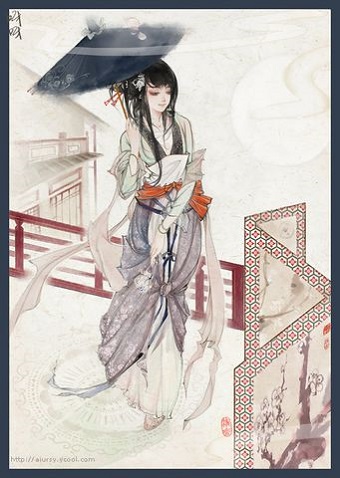 君生我未生,我生君已老。
君生我未生,我生君已老。
君恨我生迟,我恨君生早。
君生我未生,我生君已老。
恨不生同时,日日与君好。
我生君未生,君生我已老。
我离君天涯,君隔我海角。
我生君未生,君生我已老。
化蝶去寻花,夜夜栖芳草。
I was not when you were born,
You were old when I was born.
You regret that I was late born,
I regret that you were early born.
I was not when you were born,
You were old when I was born.
I wished to have been born together,
We could enjoy our time together.
You were not when I was born,
I was old when you were born.
I was so far away from you,
You were so distant from me.
You were not when I was born,
I was old when you were born.
I’d become a flower-seeking butterfly,
And sleep on the fragrant grass every night.
The poem, with plain language, expresses the author`s pity and nostalgia to a much older lover.
9. Though On The Deceased Life《离思》by Yuan Zhen (Tang Dynasty)
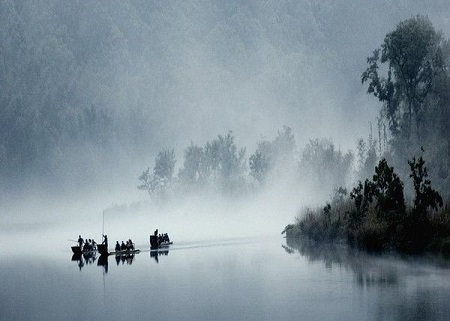 曾经沧海难为水,
曾经沧海难为水,
除却巫山不是云。
取次花丛懒回顾,
半缘修道半缘君。
Insignificant waters become,
When sailings to the oceans abound.
Misty clouds circle mount Wu around,
That’s the best scenery I have ever found.
Many a flower I pass by,
Second looks I bother not to try,
For pilgrimages as a monk I vie,
Still remember the lover I once had.
The Tang Dynasty poet Yuan Zhen composed this poem for his lover Cui Yingying. The line “Insignificant waters become, when sailings to the oceans abound. Misty clouds circle mount Wu around, that’s the best scenery I have ever found.” expresses that the poet will ever fall in love with other woman except for Yingying.
10. Butterflies in Love with Flowers《蝶恋花》by Liu Yong (Northern Song Dynasty)
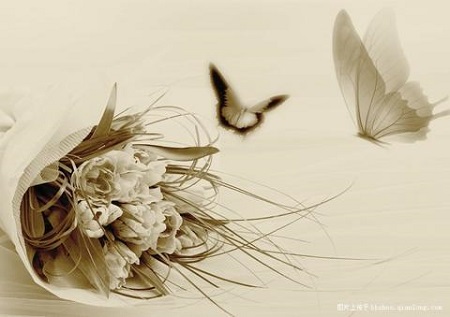 伫倚危楼风细细,
伫倚危楼风细细,
望极春愁,
黯黯生天际。
草色烟光残照里,
无言谁会凭栏意。
拟把疏狂图一醉,
对酒当歌,
强乐还无味。
衣带渐宽终不悔,
为伊消得人憔悴。
While I lean against the banister of a tall tower,
The breeze gently blows.
As I look into the distance,
The end of Spring arouses melancholy in my mind.
Surrounded by dewy grass at sunset,
I wonder who is able to understand my longing.
I would rather drink to intoxication.
One should sing when one has wine in hand,
But drinking to escape offers no reprieve.
I do not mind that my clothes are getting looser.
My lover is worthy of desire.
The poem cleverly combines lonely feelings in a foreign land with yearning for the lover, showing the hero’s determined character and persistent attitude, successfully portrays the image of a woman who misses her lover far away.

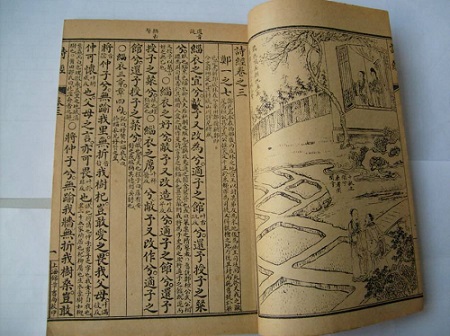
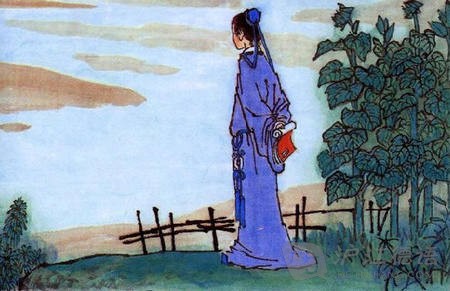

中国经典的爱情古诗词,流传了千百年。我是专职的汉语教师,我会讲授这些古诗词。可以联系我哦。Email:shuipo3008@outlook.com
I read that the《君生我未生,我生君已老》poem is not entirely ancient.
The part that is ancient is only the first 4 phrases: “君生我未生,我生君已老。君恨我生迟,我恨君生早”
The rest of it is an interpretation/continuation written by a modern poet called Cheng Dongwu
Source: https://baike.baidu.com/item/%E5%90%9B%E7%94%9F%E6%88%91%E6%9C%AA%E7%94%9F%EF%BC%8C%E6%88%91%E7%94%9F%E5%90%9B%E5%B7%B2%E8%80%81
Who is the writer of On and on going on and on
I need the Poet’s name please. “When I die, your name will fall from my lips like the last petal of a flower”
Hi Nico, it should be Yu Guangzhong(Yu Kwang-chung)’s poem named “下次的约会” or “Next Date” in English.
当我死时,你的名字,如最后一瓣花
自我的唇上飘落。你的手指
是一串串钥匙,玲玲珑珑
握在我手中,让我开启
让我豁然开启,哪一扇门?
握你的手而死是幸运的
听你说,你仍爱我,听你说
凤凰死后还有凤凰
春天死后还有春天,但至少
有一个五月曾属于我们
每一根白发仍为你颤抖,每一根潇骚
都记得旧时候,记得
你踩过的地方绽几朵红莲
你立的地方喷一株水仙
你立在风中,裙也翩翩,发也翩翩
覆你的耳朵于我的胸膛
听我的心说,它倦了,倦了
它已经逾龄,为甄甄啊甄甄
它跳得太强烈,跳得太频
爱情给它太重的负荷,爱情
爱情的一端在此,另一端
在原始。 上次约会在蓝田
再上次,在洛水之滨
在洪荒,在沧海,在星云的叆叆
在记忆啊记忆之外,另一端爱情
下次的约会在何处,在何处?
你说呢,你说,我依你
(你可相信轮回,你可相信?)
死亡的黑袖挡住,我看不清楚,可是
嗯,我听见了,我一定去
As an admirer but non-Chinese speaker, although accepting poetry is not easy to translate to another language (I even struggle with my schoolboy French!) I am struck by the beauty expressed by those I read here. We really should be humbled by these lines, many written when “The West” quite so uncivilised. However, I will not apologise as too many do, for current Western liberal ideals (despite some recent bizarre transgressions) Many thanks to all contributors.
How about simply translating character for character. And NOT embellishing the work with English faphle all looooooong winded and hippy-romantic.
I detest that.
Leave ancient poetry as is. Translate character for character and simply allow yourself to fill in the blanks. NOT have someone else decide for you as is the patronising English manner.
And I am English before someone harps on about being racist.
I agree. Let the reader interpret.
I agree. Why force these into rhymes that make the poem sound hokey and contrived?
spot on mate, made me squirm too
I kind of agree and disagree. The poems were first written with brush and ink. It, in itself, is an art form that many admire. Chinese is filled with metaphors not common in English. Let the translations become a gateway into Chinese poetry in Chinese.
胸藏文墨懷若谷 腹有詩書氣自華
劝君莫惜金缕衣,
劝君惜取少年时。
花开堪折直须折,
莫等无化空折枝。
I think this is a better translation for Shang Ye
上邪!
Oh Heaven!
我欲与君相知
I desire to know you deeply and love you
长命无绝衰
Forever may this be unchanging
山无陵
‘Til the mountains crumble
江水为竭,
The rivers run dry
冬雷震震
Thunder roars during the winter
夏雨雪
Snow falls during the summer
天地合
Heaven and Earth come together
乃敢与君绝!
Only then will I cease to love you!
I love those peom as they were mine ask the world what is love ? What is love then? What an amazing just wondering where you get the eng sub did you translate them your self any way it so beautiful
So does anyone out there know of the Sara Nichols translation of the Chinese poem ‘Wear your gold and silken garments, store not one of them away’?
Soes anyone out there know of the Sara Nichols translation of the Chinese poem ‘Wear your gold and silken garments, store not one of them away’?
Just stumbled onto this site as I was searching for something else. I am too an engineer whose interest is translating Chinese poetry into English.
First you have first character in 鵲橋仙 wrong. It is 纤 (纖) and not 织 (織). I understand these “professional” English translation require the translation rhyme. However, this destroys the local flavor and not the original meaning intended. I am from the other school of where the original meaning or intent is most important. Trying to extrapolate the poet’s intent is frowned unless supported by evidence in the poem or by the circumstance in which the poem was composed. I suppose some of these translations are by linguists rather than “real” sinologists. Here are my paltry translations,
1纤云弄巧, Filligree clouds showing their myriad shapes of delicateness,
2飞星传恨, The falling stars conveying their sorrows,
3银汉迢迢暗度。Long is the Milky Way as they cross in silence.
4金风玉露一相逢,Once every autumn, a fleetingly they shall meet.
5便胜却人间无数。Greater than those countless in the mortal world.
6柔情似水, Tender is their love like flowing water,
7佳期如梦, Their meeting is like but a dream,
8忍顾鹊桥归路。 On their return routes, unwillingly to look back at the Magpie Bridge.
9两情若是久长时, For if their love for each other is eternal,
10又岂在朝朝暮暮。 Would it matter in seeing NOT each other every day and night?
1. This hints at the skill of the Weaver Girl. Her job is to weave clouds.
2. The falling stars represent the fairy lovers as they crossed the Milky Way
3. Linguistically translated, “The Milky way is long, [meandering] in silence.
4. Golden wind, poetic synonym for autumn. Jade dew, another poetic expression for fleetingness – gone by late morning. The time when the meeting takes place. However, the “golden wind” depicts the cowherd and the “jade dew” the Weaver Girl. Translating as such would lose the local flavor.
5. Double meaning. It can mean that their love is greater than those on earth (that is being day and night together) or that it is their joy in seeing each other.
6, 7. Describes how they feel in the meeting.
8. The bridge is a metaphor for their back views.
1曾经沧海难为水,Once the vast ocean seen, no river can be compared to it.
2除却巫山不是云。Other than the clouds of Mt. Wu, none others can come close.
3取次花丛懒回顾, Leisurely through the flower thickets, I’m too lazy to have a second look.
4半缘修道半缘君。Partly I’m cultivating the way of Tao and partly because of you.
1. 水 here means rivers like in English “waters”
2. Double meaning… a. The clouds at Mt. Wu are magnificient. b. alluding to the story of Mt. Wu where the Duke of Chu met and had a liason with the Goddess of Mt. Wu.
3. Literally, turning back his head for a second look at the flowers (women)
4. The translation you had is totally wrong. Abstinence from sex, desires etc is a no-no when trying to seek enlightenment in Tao. 君 is an honoric title/term for his wife. For example, 徐太君, the matriach of the Yang family warriors.
some of them are quite brilliant, thanks. but I am not particularly agree with the translation of
除去巫山不是云.over there the focus is not that the Wu’s clouds is the best scenery i see, but the focus is all the others are not in my eyes then.
The translation of “Beating the Drum” is not that exact. It was originally about the bonds between comrades, though many persons regard it as a poem of love today.
can anyone
pls translate that to mandarin
Omar, It’s tough to find good translators for poetry. Good luck to you. If you do find one please be kind enough to let me know. Thanks.
I think I am reasonable good. I am an Engineer/Scientist but very interested in Poetry translation. If you have some, I can try some in my spare time. Though I do not have lots of time with daily full time work.
I will give it a try. What is the title?
in most languages poetry loose the meaning In transalation
can anyone translate this for me please
I’m drenched
in the flood
which has yet to come
I’m tied up
in the prison
which has yet to exist…
Not having played
the game of chess
I’m already the checkmate
Not having tasted
a single cup of your wine
I’m already drunk
Not having entered
the battlefield
I’m already wounded and slain
I no longer
know the difference
between image and reality
Like the shadow
I am
And
I am not
我濕透了
在洪水中
尚未到來
我被綁起來了
在監獄裡
尚未存在……
沒有玩過
象棋遊戲
我已經是將軍了
沒有嚐過
一杯你的酒
我已經醉了
沒有輸入
戰場
我已經受傷並被殺了
我不再
知道區別
形象與現實之間
像陰影一樣
我是
和
我不是
that translation for Shang Ye was not exactly correct. Shang Ye means by the heavens
Great compilation! Just wondering where you got the English translation of these poems? Did you translate the poems yourself? Or is there an “official” translation of these classic Chinese poems available? thanks.
Hi Christiana,
All these translations are from professional translators like English teachers and foreign Chinese language experts. What do you mean by “official”, you mean an English book about Chinese poems?
Regards, Peter Wang